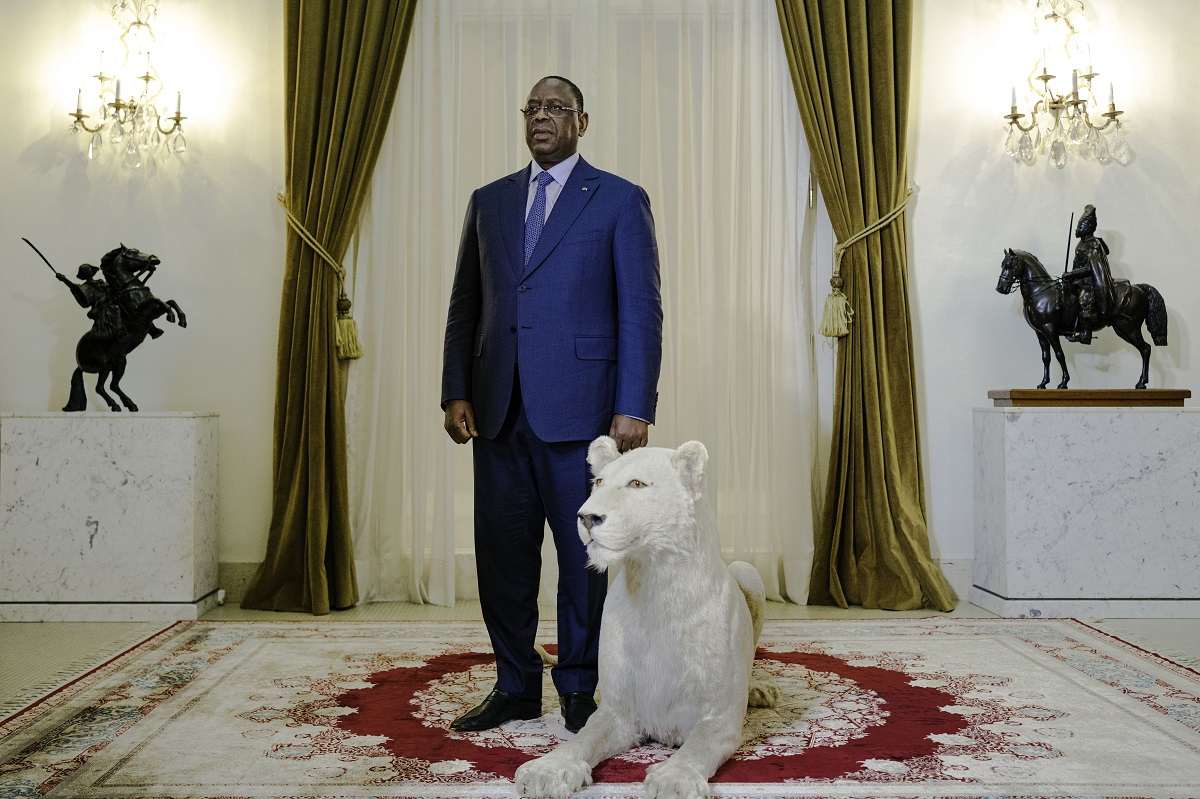
Senegal’s president, Macky Sall, poses for a photo at the presidential palace in Dakar on Jan. 16.
15:54 JST, February 4, 2024
DAKAR, Senegal – Senegalese President Macky Sall on Saturday announced that elections scheduled for Feb. 25 would be indefinitely delayed, marking a first in Senegal’s history and fueling concerns about the electoral process in a country with one of the strongest histories of democracy in West Africa.
Sall, who has served for two terms, said during an address to the nation that the delay was because of a dispute over which candidates were able to run. He reiterated that he would not seek a third term but gave no indication of when the elections would be held.
A number of the top contenders to succeed Sall – most notably, popular opposition figure Ousmane Sonko – have been barred by the courts from running. In June, protests by supporters of Sonko, who faced multiple charges that critics said were politically motivated, were among the deadliest in Senegal’s history and left more than a dozen people dead.
Sall’s announcement of his decision not to seek reelection – which he made in July, after years of refusing to rule out the possibility – has been followed by a period of relative calm. But the choice to delay the vote just hours before official campaigning was scheduled to start could fuel a new round of protests in Senegal, where frustration with the political process was already running high.
“It is a flagrant violation of electoral law and the constitution,” said Maurice Soudieck Dione, a political science professor at Gaston Berger University in Saint-Louis, Senegal. “What the president has done today is to take the sovereignty of the people into his own hands.”
Sall said that his decision to postpone the elections was intended to preserve their credibility, which he said was jeopardized by disagreements between the constitutional court and legislative branch centered on which candidates are allowed to run. Sall promised to hold a national dialogue to ensure that the elections are fair and transparent but offered no timeline.
In an interview at the presidential palace last month, Sall celebrated Senegal’s long history of democracy and warned of the dangers of extreme populism. He noted that the country’s history of elections dates back to 1848, when the first Senegal was given a seat in the national assembly of its colonial power, France.
“Senegal must continue its democratic trajectory,” he said then, adding that the rise of populism, especially among young people, has been fueled by the power of social media and represents a threat to democracy. But he added that he thought the situation in Senegal could be managed, saying: “It is the role of each state to ensure that peace and public order are preserved.”
Since its independence from France in 1960, Senegal has had four transitions of power and no military takeovers, making it a rare bright spot for democracy activists in the region, where a number of military leaders have seized power in coups in recent years, most recently in Niger and Gabon. Military juntas also wield power in Mali, Burkina Faso and Guinea.
In Senegal on Friday, one of the other opposition parties, representing a former president’s son, Karim Wade, who was barred from running because he is a dual citizen, requested that the election be delayed because of concerns about the court’s decision to bar Wade and others from running.
But a coalition representing ex-Dakar mayor Khalifa Sall pushed back, saying that a delay would represent an “institutional coup d’état” and create “unprecedented political instability.”
Guillaume Soto-Mayor, a nonresident scholar at the Middle East Institute, said the decision to delay the election didn’t seem to have constitutional grounds and appears rooted in fear among the elite that Bassirou Diomaye Faye, the candidate selected by Sonko to run as his replacement, would win if elections were held Feb. 25. Sall was supporting Prime Minister Amadou Ba.
Sonko and his party, which was dissolved by Sall’s government, gained popularity with strong critiques of Senegal’s enduring ties with France and the West African nation’s political class.
“They seem to have calculated that within the national and regional context, and anticipating future economic opportunities, it was too much of a risk,” said Soto-Mayor, noting that the rise of leaders like Sonko and Faye elsewhere in the region has threatened institutional power-brokers. “It’s a huge decision that will have lasting consequences.”
Top Articles in News Services
-

Survey Shows False Election Info Perceived as True
-

Hong Kong Ex-Publisher Jimmy Lai’s Sentence Raises International Outcry as China Defends It
-

Japan’s Nikkei Stock Average Touches 58,000 as Yen, Jgbs Rally on Election Fallout (UPDATE 1)
-

Japan’s Nikkei Stock Average Falls as US-Iran Tensions Unsettle Investors (UPDATE 1)
-

Trump Names Former Federal Reserve Governor Warsh as the Next Fed Chair, Replacing Powell
JN ACCESS RANKING
-

Producer Behind Pop Group XG Arrested for Cocaine Possession
-

Japan PM Takaichi’s Cabinet Resigns en Masse
-

Man Infected with Measles Reportedly Dined at Restaurant in Tokyo Station
-

Israeli Ambassador to Japan Speaks about Japan’s Role in the Reconstruction of Gaza
-

Videos Plagiarized, Reposted with False Subtitles Claiming ‘Ryukyu Belongs to China’; Anti-China False Information Also Posted in Japan























